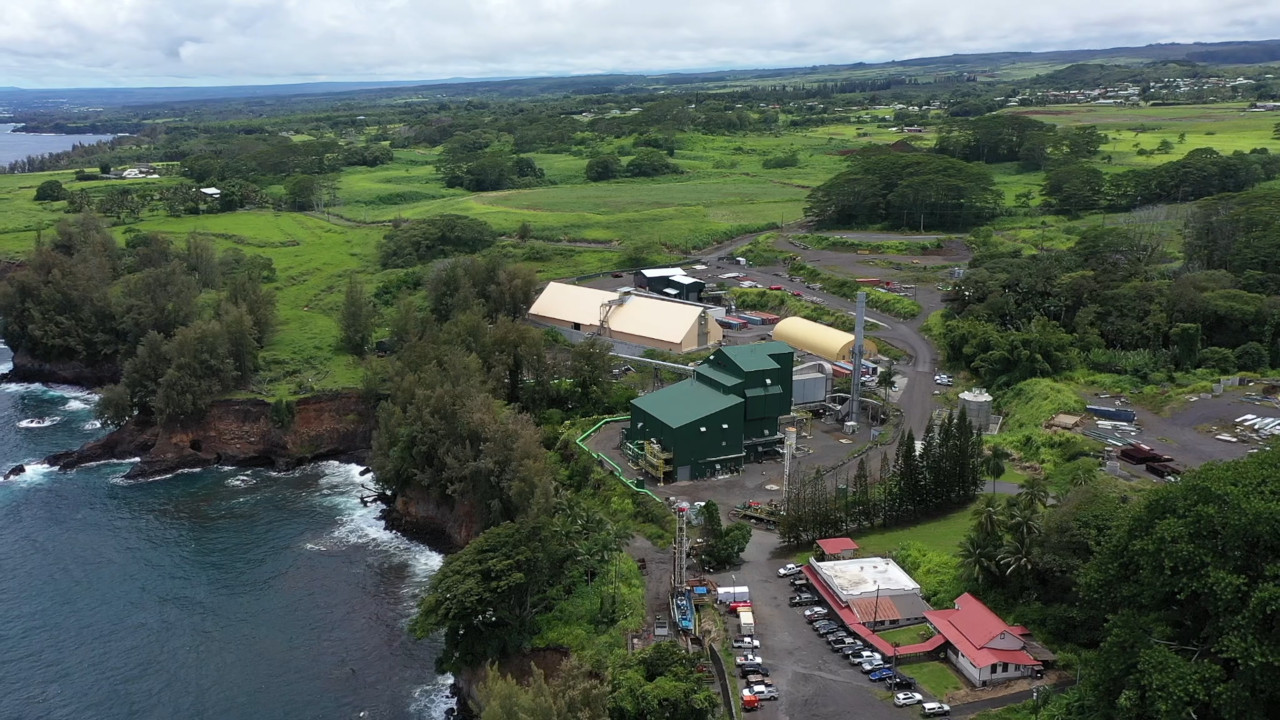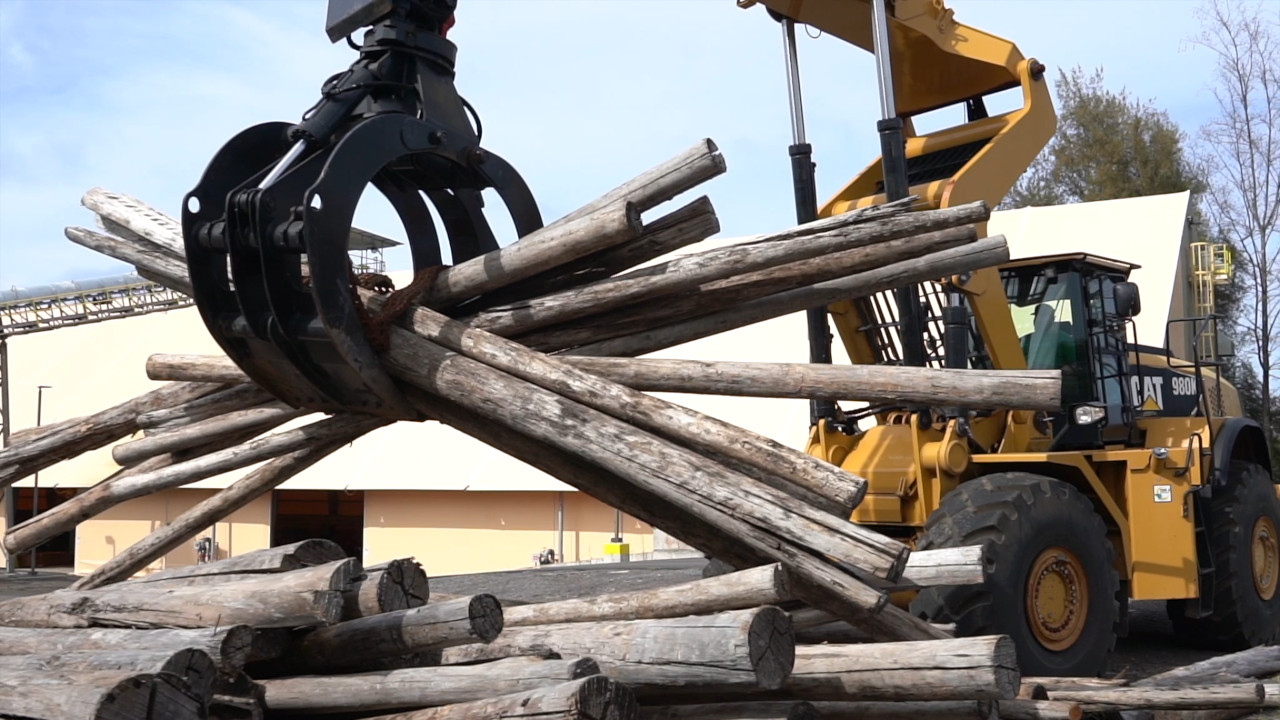(BIVN) – Hu Honua Bioenergy, LLC is again taking Hawaiian Electric to federal court, alleging the utility’s “chronic monopoly behavior has contributed to wildfire risks, nation-high electricity rates, an unreliable electric grid, and prevention of firm renewable energy for Hawaii’s ratepayers.”
Over the last several years, Hu Honua has been planning to burn harvested trees at its refurbished Pepeʻekeo power plant in order to produce energy to be sold to the Hawaiian Electric grid. However, a series of legal battles – most recently in the Hawaiʻi Supreme Court – has stalled the effort.
Hu Honua is now seeking over $1 billion in damages. The federal litigation is essentially a continuation of an antitrust and breach of contract lawsuit filed against Hawaiian Electric in 2016, following the termination of a PUC-approved Power Purchase Agreement (PPA) between the two companies in 2012. An amended and restated PPA between Hu Honua and Hawaiian Electric (then HELCO) put the original antitrust lawsuit on hold. That amended and restated PPA was never approved by regulators.
Here is the full news release shared by Hu Honua attorneys:
Hu Honua Bioenergy, LLC (“Hu Honua”) yesterday filed a motion seeking leave to update its antitrust charges in its litigation against Hawaiian Electric Industries, Inc., and related companies (collectively, “Hawaiian Electric”) in federal court.
Hu Honua’s updated complaint incorporates new facts and developments uncovered since the litigation was first filed in 2016, and argues that Haw*aiian Electric has a near-total monopoly over the wholesale firm power generation market on Hawaii Island. Hawaiian Electric’s monopoly has caused direct harm not only to Hu Honua, but also to Hawaii Island residents who have been plagued by increasingly higher rates and grid reliability issues.
Hawaiian Electric’s termination of Hu Honua’s power purchase agreement in January 2016 delayed Hawaii’s transition to renewable energy mandated by state law and the feedstock for Hu Honua’s biomass power plant was to include, among other things, woody invasive plant species on Hawaii Island. Hu Honua’s productive use of such overgrown and invasive species would benefit the environment and mitigate well-documented wildfire risks presented by such overgrowth.
The updated complaint alleges that Hawaiian Electric has acted “with shameless arrogance and disregard not just for competition, but for the people, economy, and environment of Hawaii Island.” Hu Honua asks the U.S. District Court sitting in Honolulu to allow the case to move ahead based on the updated complaint. Hu Honua seeks an end to all monopolistic conduct and requests the Court award it more than $1 billion in antitrust damages. Hu Honua also requests that Hawaiian Electric be ordered to transfer its Hamakua power plant, a facility Hawaiian Electric acquired via a “straw purchase” scheme, to an independent owner to restore competition for the benefit of Hawaii Island ratepayers. This “straw purchase” was designed to obscure Hawaiian Electric’s controlling interest after state regulators had denied its previous bid to acquire Hamakua.
“Hu Honua’s newly constructed facility would bring reliable, renewable energy to Hawaii Island at a competitive price, but sits idle today solely due to Hawaiian Electric’s predatory and anticompetitive conduct, which it has ruthlessly wielded to entrench and expand its monopoly over Hawaii’s power sector,” said Daniel G. Swanson of Gibson, Dunn & Crutcher LLP, attorney for Hu Honua.
Hawaii residents, including those on Hawaii Island, already face the highest average electricity prices by far in the United States—nearly three times the U.S. average price—due to costly imported petroleum products being burned in Hawaiian Electric’s aging and increasingly unreliable power generation facilities, whose costly operation continues to be extended and protected by Hawaiian Electric’s monopoly.
According to the updated complaint, by keeping Hu Honua out of the market and acquiring the largest independent power plant on Hawaii Island from Hamakua Energy Partners, L.P. in 2017, Hawaiian Electric has cornered more than 90 percent and at times nearly 100 percent of all firm power generation capacity on the Island. Since 2017, ratepayers have seen their electric rates skyrocket by 50-100 percent or more while energy reserve margins have deteriorated, and the risk of power outages has increased. Hawaii Island residents have been instructed at least nine times between August 2022 and March 2023 to reduce power consumption during peak hours.
The Hu Honua attorneys also attached these details to the news release, providing more information on the complaint:
Hu Honua originally filed its lawsuit in 2016 against Hawaiian Electric Industries, Inc. (HEI), and its two subsidiaries, Hawaiian Electric Company (HECO), and Hawaii Electric Light Company, Inc. (HELCO) (collectively, the “Hawaiian Electric Defendants”), along with other defendants. That litigation followed the termination of a PUC-approved 2012 power purchase agreement between HELCO and Hu Honua and asserted antitrust, breach of contract, and other state law claims. HELCO moved to terminate the power purchase agreement with Hu Honua just three weeks after Hawaiian Electric struck a monopolistic deal to buy the Hamakua plant from its biggest rival.
To date in the litigation:
- In May 2017, Hu Honua reached a conditional settlement with the Hawaiian Electric Defendants for an amended and restated power purchase agreement (PPA) with Hu Honua.
- This conditional settlement was entered into on the heels of the PUC’s denial of HECO and HELCO’s application to acquire the Hamakua plant.
- Unbeknownst to Hu Honua, however, Hawaiian Electric intended to acquire the Hamakua plant despite the PUC’s rejection.
- The parties conditioned the settlement on approval by the PUC of the amended PPA. The lawsuit was paused by the Court while the parties sought approval from the PUC.
- The PUC initially approved the amended PPA agreement in July 2017.
- In November 2017, Hawaiian Electric bypassed the PUC and acquired the Hamakua plant via a “straw purchase” scheme involving newly-formed subsidiaries.
- In May 2019, at the behest of a third-party challenger, the Hawaii Supreme Court ordered the PUC to reconsider its approval of the amended PPA agreement.
- On remand, the PUC rejected the amended PPA agreement, and the Hawaii Supreme Court affirmed. Hu Honua’s updated complaint alleges that Hawaiian Electric took steps to frustrate approval of the amended PPA before the PUC and Supreme Court.
- Hu Honua today filed a motion in federal court seeking leave to file an amended and supplemental complaint, which streamlines and clarifies the prior complaint, and adds the three subsidiaries of Hawaiian Electric that were involved in the purchase of the Hamakua plant: Pacific Current, LLC; Hamakua Holdings, LLC; and Hamakua Energy, LLC.
In today’s filing, Hu Honua seeks the Court’s approval to proceed with the filing of the updated (amended and supplemental) complaint, which outlines the anticompetitive conduct of the Hawaiian Electric Defendants up to the present time. Hu Honua invested hundreds of millions of dollars in constructing its power generation facility based on the 2012 PPA agreement. But, as the complaint alleges, the PPA was terminated in 2016 as part of a broader scheme to monopolize the market that continues to this day.
The complaint alleges that Hawaiian Electric has been able to delay the planned retirement of its own antiquated fossil fuel plants through its control over the purchase of wholesale firm power for resale and its exclusion of competitive energy producers. The updated complaint asserts that in 2014, Hawaiian Electric represented to the PUC that several of its fossil fuel plants would be deactivated in coming years. This would create room for entry by independent power producers like Hu Honua. But according to the complaint, after terminating the agreement with Hu Honua, Hawaiian Electric told the PUC it would postpone the deactivation of the older, less efficient plants. The complaint asserts that the Hamakua plant acquisition in 2017, together with those older plants, gave Hawaiian Electric control of more than 90 percent of the firm energy generation market on Hawaii Island. To date, Hawaiian Electric has still not retired any of its aging fossil fuel plants since it walked away from its PPA with Hu Honua, even though their unreliability presents a risk to the continuity of energy supply on Hawaii Island.
The result of Hawaiian Electric’s monopolistic exclusion of firm competition has been a 10 percent decline in net firm energy generating capacity and repeated energy shortages, with Hawaiian Electric instructing Hawaii Island residents to reduce consumption at least nine times between August 2022 and March 2023.
The alleged anticompetitive conduct by the Hawaiian Electric Defendants has also led to substantial price increases for residential electricity. After gradually increasing from 32 to 37 cents per kWh from 2016 to 2019, residential electricity prices skyrocketed to 48 cents per kWh in 2022. Meanwhile, HELCO’s rate base (which contributes to HELCO’s profits) rose from $484 million in 2016 to $572 million in 2022.
The Hawaiian Electric Defendants’ anticompetitive conduct has not only harmed consumers and the environment, but has also caused devastating financial impacts to Hu Honua. Hu Honua’s updated complaint seeks damages, including at least 30 years of lost profits amounting to more than $1 billion in antitrust damages after trebling.



by Big Island Video News11:25 pm
on at
STORY SUMMARY
PEPEʻEKEO, Hawaiʻi - Unable to secure an approved power purchase agreement with Hawaiʻi Electric, Hu Honua has again filed a complaint in the US District Court.